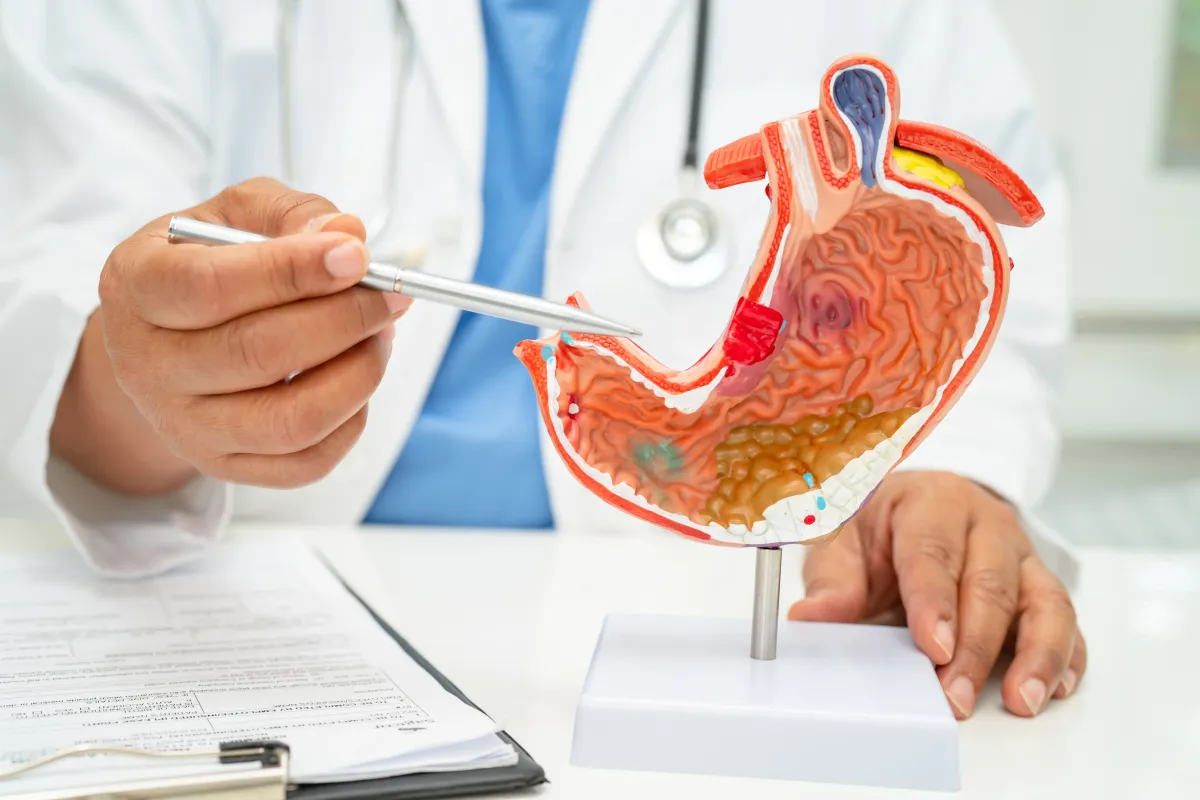Gastritis: Gut Health
Gastritis is the inflammation of the stomach lining, causing pain and indigestion, often due to infections, NSAIDs, or alcohol.

Description of gastritis:
Gastritis is a medical condition characterized by the inflammation of the stomach lining. This inflammation can occur suddenly (acute gastritis) or gradually (chronic gastritis), and it may lead to symptoms such as abdominal pain, nausea, vomiting, and indigestion.
Several factors can contribute to the development of gastritis, including excessive alcohol consumption, prolonged use of nonsteroidal anti-inflammatory drugs (NSAIDs), infections caused by bacteria such as Helicobacter pylori, and other irritants that may damage the stomach lining.
The condition's progression can lead to complications if left untreated. Chronic gastritis, for instance, can result in atrophic gastritis, which involves thinning of the stomach lining and decreased production of stomach acids, potentially leading to further digestive issues. Understanding the underlying causes and managing them effectively is crucial in treating gastritis and preventing potential complications. Lifestyle modifications, such as reducing alcohol intake and avoiding NSAIDs, along with medical treatments, can help in managing the symptoms and healing the stomach lining.
Role of Gut Imbalances in gastritis:
Gut imbalances, particularly those involving disruptions in normal gut flora, significantly impact the development and severity of gastritis. Gastritis is characterized by the inflammation of the stomach lining, and a well-balanced gut microbiome is essential in maintaining the stomach's protective mucosal barrier against such inflammation.
When the gut microbiome is imbalanced, particularly due to a deficit of beneficial bacteria, harmful bacteria like Helicobacter pylori can proliferate. H. pylori is a well-known bacterium that thrives in a low-acid environment and is directly linked to chronic inflammation and persistent gastritis. It disrupts the protective mucosal barrier of the stomach, making it more vulnerable to irritation and inflammation.
Furthermore, other harmful bacteria and pathogens in the context of a gut imbalance can produce toxins that exacerbate damage to the gastric lining, accelerating the onset and progression of gastritis. This effect is often compounded by "leaky gut" syndrome, where increased intestinal permeability due to bacterial overgrowth allows foreign substances, such as undigested food particles, to enter the bloodstream.
These intruders can stimulate the immune system, leading to heightened inflammation in both the gut and stomach lining. Overall, maintaining a balanced gut flora is crucial for preserving the integrity of the stomach lining. Imbalances can not only initiate but also aggravate gastritis, underlining the importance of gut health in digestive disorders. Therefore, interventions that restore microbial balance, like probiotics, prebiotics, or dietary adjustments, may be beneficial in managing gastritis symptoms and inflammation.
Restore Gut Function and Ease Symptoms of Gastritis:
Gastritis, which is the inflammation of the stomach lining, can be highly uncomfortable, often resulting in symptoms such as abdominal pain, nausea, bloating, and indigestion. Restoring gut function and easing the symptoms of gastritis can primarily be achieved through a combination of dietary changes, supplements, and natural remedies.
Nutritional Supplements:
Certain nutrients can significantly aid in healing the gastrointestinal lining. Supplements like L-glutamine, at a dose of 1000 mg daily, can help restore the integrity of the gut lining. Vitamin A at 40,000 IU and zinc (preferably zinc picolinate) at 30 mg daily are known for their gut-healing properties.
DGL and Vitamin C Ascorbate: Consuming Deglycyrrhizinated licorice (DGL) and ascorbate forms of vitamin C can promote healing of the stomach lining. DGL helps in soothing and repairing the stomach lining without affecting blood pressure, which is a concern with regular licorice.
Probiotics: Including probiotics in your diet can alter the intestinal flora balance favorably. Probiotics containing Lactobacillus acidophilus and Bifidobacterium bifidum are particularly effective in inhibiting harmful bacteria and enhancing immune function.
Chamomile Tea: Drinking chamomile tea is beneficial due to its anti-inflammatory properties. It can help alleviate heartburn and the inflammation of the esophagus, providing relief from gastritis symptoms.
GAPS Diet: This diet involves eliminating irritants and introducing nourishing substances to heal and seal the gut lining. It’s particularly useful for those with symptoms like reflux, diarrhea, or bloating, and helps repair the digestive tract over time.
Artichoke Extract: Artichoke extract enhances liver function and bile production, aiding in digestion. Taking 500 to 1000 mg per day of cynarin from artichoke extract can significantly improve digestive symptoms.
Turmeric: Known for its antioxidant properties and ability to stimulate digestive juice secretion, turmeric can relieve symptoms of dyspepsia and assist in ulcer healing. It’s a versatile supplement for managing gastritis symptoms. While these approaches can be beneficial, it is essential to proceed under the guidance of a healthcare professional to ensure they are appropriate for your specific condition. If symptoms persist, it’s crucial to seek further medical evaluation.
